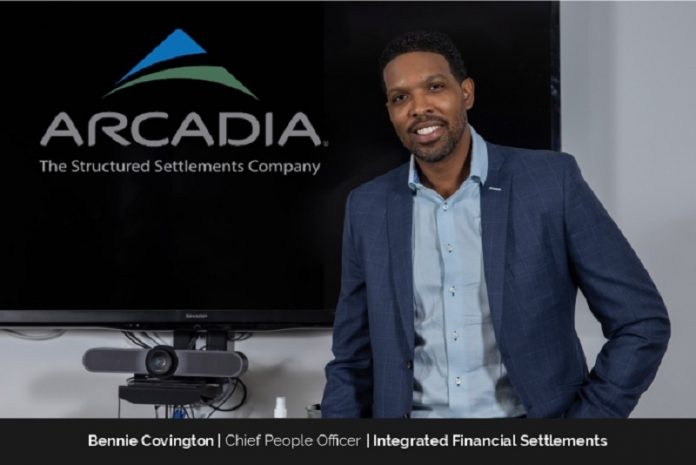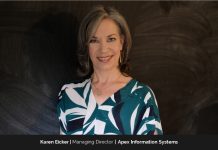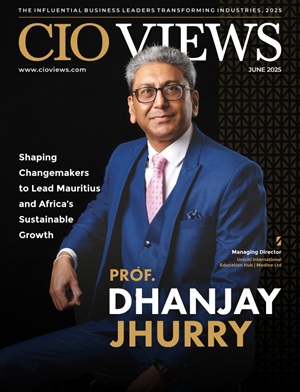
Bennie Covington is the “resourceful” Chief People Officer of Integrated Financial Settlements, a group of companies dedicated to structuring financial security to individuals and families who have experienced personal injury.
A self-aware leader, Bennie knows they would be in danger if he considers himself the smartest person in his discipline or the room. It is because there are many variables in the global market, and he can’t know everything. He believes in being more adept at having the right questions rather than having the right answers. Resourcefulness, according to Bennie, means leveraging people. There are people, both internally and externally, that Bennie, as a leader, surrounds himself with. He asks them the best questions and listens to understand some of the answers, and following that, he and his team use those resources to develop comprehensive strategies; They poke holes in those strategies to figure out what is impactful. They are unafraid of removing strategies that are not effective or does not get them closer to their workforce goals.
For Bennie, at this moment, success means having a clearly defined vision for what one wants to accomplish and taking incremental steps to get there. Success, according to him, is just moving along the line from where one is currently to where one is trying to go, and being able to demonstrably say, “hey, we were here and this was our goal, and because of these actions we have gotten closer to that goal.”
Bringing Change to Organization
After joining Integrated Financial Settlements in June of 2018, Bennie enabled its human resources team to take their place as strategic business partners and leaders in the company. Integrated Financial Settlements and its competitors are similar in almost all aspects. The real difference, according to Bennie, is how they organize, who they put in positions, how they collaborate on ideas, how they determine their values, and how these values help reach the goals. He believes that the human resource function can help the organization be more effective by enabling it to leverage its people much better – it now provides Integrated Financial Settlements with the competitive advantage.
At the organization, the human resources team now has a seat at the table, where they say, “what do we do to bring the best out of our people and what do we need to do strategically to ensure they can be effective in their roles”, says Bennie. He has changed the way people are looked at in Integrated Financial Settlements.
Bennie and his team determine whether they have the right people, who could potentially be with them for the next 15 to 20 years, who are the next people they need in the organization to address the challenges, what is the total cost of it, and what are the trends they are noticing in the market as well as internally. “This has helped frame a new way for the organization to look at its business,” Bennie says. “That is what I am most proud of because that was not the competence the organization had prior to my coming on board.” It quickly became one once he joined.
According to Bennie, it happened because many of the leaders had the appetite for a different perspective on how to grow the business, and he was able to frame that and work with them collaboratively to address issues.
Bennie believes that leadership does not happen in a vacuum. So, he gives “team effort” the credit for changes that have taken place under his leadership at Integrated Financial Settlements.
Moving to Corporate America from Radio
Bennie started his professional journey as a radio host. “Life has a funny way of moving you along the path that you had no idea that you would take,” says Bennie.
When he was in college, he became a call screener for a hit radio show in Grand Rapids, Michigan. He did that for a couple of years, and after that, he moved into the producer role for that show and then had an opportunity to host a political talk and sports talk show on that station and its sister station respectively. “I was certain that is what I was going to do with my life. I was going to be a radio talk show host,” Bennie says. “It is all I wanted to do, and there was nothing else that tickled my fancy. I couldn’t see myself in corporate America.” He is now very much a corporate guy.
Bennie’s career took a sudden turn when his employer Clear Channel Radio laid off 1800 people across the country. He was one of them who lost his job. Bennie recalls that he was young in the industry, and the jobs offered to him were in places where he didn’t want to live in. The only jobs he could get were in small places and that intimidated him. “I was not comfortable making a move and realized that in
order for me to have a career, I would have to look into other places,” Bennie says. This led him to two roles – a sales position and running his consultancy business.
Bennie hoped that the sale position would help him pay the bills while he worked to build his consulting business. The latter has proved to be a very successful company for him and his family. Bennie’s wife is the one who currently drives the consulting business. “At the time, we were looking at that [consulting business] as an opportunity to solve some of the challenges we were seeing in corporate America,” Bennie says.
He feels that his work in the radio industry helped him succeed in the corporate arena. It taught him how to communicate and how to engage people. Those skills really helped when he was consulting because he could leverage them and make an impact. For example, radio producers and hosts had to keep their listeners on the edge enough so that they could have a successful commercial break. As a consultant, Bennie used those skills to make managers or supervisors reconsider their approach to having their teams collaborate better in meetings.
Bennie’s stint on the radio shows was eventful and interesting, but now when he looks at it, he feels that he wouldn’t have been happy in that industry in the long term. He has no desire to travel back in time and become a radio host again. He, however, says that there might be a time maybe when he does a podcast, following his retirement someday.
“I am really happy with the way this worked out. I am in a position today where I am able to use the best parts of the way I think, communicate, problem solve, and collaborate, and that is why I think probably a radio career wouldn’t have worked long term,” Bennie says. “I am happy here now. I might not have been so happy long term in that career 15 or 20 years later.”
From Hating HR to Embracing It
The younger Bennie had no passion for the HR industry. He, in fact, “hated” HR for a long period of time and thought of it as a broken department. In his opinion, HR people could not be trusted, and they were not open to recommendations that would improve productivity. In many ways, Bennie was an anti-HR person.
Bennie says that he always had a passion for helping organizations figure out how they could get the most out of their people, but the help he offered was from a consultant perspective. Once he realized that he could impact organizations by being in the consultant world, he began to look at how he could fix HR.
“People really feel HR does not help them navigate the evolutions of the business, and the business is also not certain that the HR can help it navigate the evolutions of the business,” Bennie says. When he was part of the consulting world and making inroads to align the people resources with outcomes and even with legacy systems that prohibited folks from being successful or rewarded the wrong behavior, he would get a request from individuals or companies that he worked with. They would say, “Hey, I know you are a consultant but work with us in the HR department, you could really help us there with our people.”
Bennie received plenty of such request, which made him realize that his biggest opportunity for impact might be in that department. He stepped onto the human resources landscape because of that.
Challenge: Not Understanding Business
Everyone wants to work on businesses and make them better. “We hear this from employees all the time,” Bennie points out. But they hardly know about the business. Early in his career, Bennie did not have much understanding of the business, such as the distribution cycle or methods of an organization, or headwinds and stakeholder pressures.
“All day you can say I want to get employees engaged and really want the organization to take advantage of the workforce, but if you really don’t understand the business and what must happen in order for any of it to be possible, then you are going to struggle,” Bennie explains. “I early on didn’t quite understand that.” He feels that he was not mature enough to recognize or understand what one needs to do before one can bring changes to the organization. For Bennie, it was a big maturity lesson for him as well as a challenge.
He remembers having a conversation with a manager who was into training and development. Bennie had a good relation with her, and he used to talk to her all the time. When he applied for a position – a promotion – he thought that his last interview would be good as she was the last interviewer. He was almost confident that he would get that position after having a talk with her. But, when the interview started, things didn’t go as Bennie expected. The manager began asking him questions that he had never been asked before. For example, she asked him about estimated cost of a program and return on investment on their business.
“I was very humbled because I didn’t know the answers at all,” Bennie recalls. “I could not even estimate accurately. She knew this, and this was a teaching moment to help me understand that perhaps I was not ready.”
For Bennie, his biggest challenge was to increase his business acumen, making sure that he understood what businesses were doing before he determined or decided that he had the plan to help it better realize its goals.
Joining Financial Settlements Industry
Bennie has worked in different industries such as advertising, telecom, and non-profit. He was in positions in every role where there was some huge transition – change in the position because of a merger or a reorganization. As those organizations kept shifting, Bennie had no other option but to leave. “Things kept changing because they were not the right fit or they were going in a different direction,” Bennie points out. It happened consistently, and he actually thought that it would prove to be detrimental to his career.
Bennie now feels that nothing helps understand business more than seeing it from different vantage points of the industries. Every company has its own particular way of doing things, but it ultimately comes down to, companies and organizations trying to do things that help them sell things to other people, and one gets to see that from telecommunication, advertising, marketing, education, and finance perspectives.
Bennie likes the financial industry because it has a few things going for it. “If you are in the industry and you truly want to make a difference to the organization, you have the chance to really impact a lot of people, especially if you consider finances are a big part of the human experience,” Bennie says. “What I really love about the finance industry is that it is kind of a universal language, and if you can help a company be effective at helping people navigate financial challenges, then you can probably make an impact on the world.”
Take, for example, Integrated Financial Settlements. Like most people who are not aware of the settlement industry, Bennie, too, did not know much about it. He points out that it is a small industry, although it should be bigger than it really is. It is an industry that helps people who have had catastrophic and life-changing injuries or a beneficiary to someone who because of the injury is no longer financially solvent over the course of the injury, and it helps them to focus on things that matter most.
Bennie points out that a lot of industries talk about doing really great work for people, but the settlement industry is one of those industries that actually does that. Integrated Financial Settlements is a leader in this industry. Its work impacts the most vulnerable people in the best possible way possible.
Role and Responsibilities
Bennie’s workday is more hectic than he would like it to be. He spends a large part of his day meeting with executive teams, his team, and meeting with members that work across several disciplines, such as IT security, consulting, IT software engineering, and operations. Bennie holds these meetings to make sure that everyone is on the same page and marching toward specified goals.
The other part of it, Bennie says, is once they are all on the page, he goes back to his team and ensures that his people resources systems and the governance support where they are going, so they know that they are on the same page, and they are marching towards the same goals. He and his team also determine why there are gaps and whether they are indicative of larger trends that they need to look into and refine accordingly. It may lead to returning to the table reassessing their strategy. “I find myself doing that all the time in my role and trying to make sure everyone is on the same page,” says Bennie.
Bennie and his team follow a very agile process, and they are retrospective. “We then get more information, refine the strategy, and make a few steps toward it, and then we repeat the process” Bennie says. “That is a typical day. I probably have 5 or 6 meetings a day and work with teams to tactically build processes and derive outcomes that align with building consensus.”
What Are the Plans for Future?
For the company, many settlements happened both internationally and domestically. Bennie points out that they are able to help structure those settlements, as they have been able to build unique expertise over the last 50 years that allows them to understand what a truly beneficial structure settlement looks like. “If we do what we do very well, we have lifetime income for someone who has been compromised,” he adds.
The party that sets fault might save significant money while also still providing the resources necessary for that injured individual. According to Bennie, they do that by understanding how to structure those settlements using new ways, financial products, medical set asides, and other such things. “We are not in enough of those mediations because while we are a 6-billion-dollar industry – we probably should be 40 to 50 billion – we just have not scaled at the level necessary to be part of the process and provide what we provide, which is a huge disservice to the individuals that are compromised due to injury,” he adds.
Bennie says that their goal, which has always been their goal, is to leverage technology, growth of individuals, and new products to be at the seat at more mediations and to help structure more settlements. They intend to do that exponentially. “So, we not only need to scale as a company that is approximately 32 percent of the industry, but we also need to take our position as the leader and help grow this industry so that the good work that we do can actually have an impact on most people who are experiencing an injury settlement,” he adds.
Everyone at Integrated Financial Settlements is prepared to do all that – that is one of the reasons why they have revamped all their technologies. The company is also building a proprietary technology. It is also recruiting outside the industry to understand their unique industry and also to leverage their expertise. Bennie says that they have to introduce new people to the industry.
“Our goal is to exponentially grow the industry, and we think we can grow to a 20, 30 to 50 billion industry,” he adds.
Message to Aspiring Leaders in the HR Industry
Bennie believes that this is the golden era for human resource professionals. The business and its people are asking for new insights and new thoughts to tackle biggest issues, human resources are uniquely positioned to be able to do it. In fact, businesses are asking human resources professionals to be more analytical and understand this, and be a strategic thought leader, Bennie points out in his message to aspiring leaders.
“Anyone who is aspiring to be in HR needs to become a Business Person – a business executive first, who understands how to leverage the most key resource – in many organizations, it is people, it is the people systems, people structure, and people policies,” he adds. He encourages aspiring HR leaders to become strategic leaders.
“If we as HR professionals take our place as strategic business leaders who understand how to get the most out of our people in order to reach goals, and we can measure that and analyze it, and provide training and help the business reform its people operations around those goals, I can see that the next great CEOs in the future will come directly from this discipline,” Bennie says.
“Anybody aspiring to grow, become more analytical, make certain you understand finance and legal documents, make certain you understand business,” he adds.




















